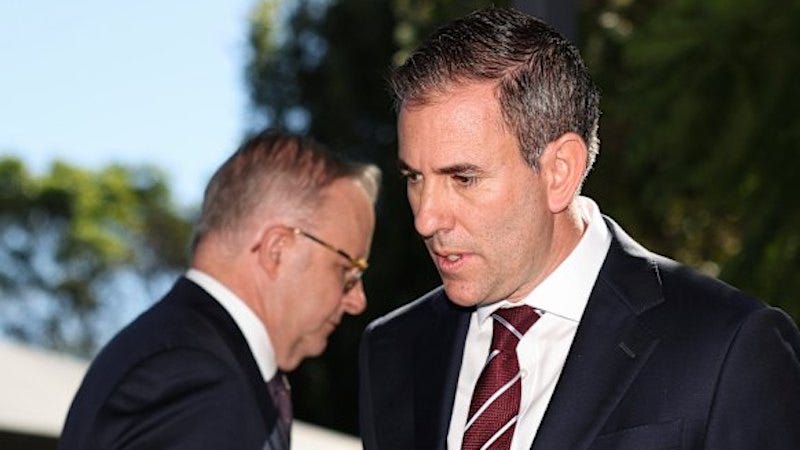The fight for fairness: Reforming superannuation in Australia
The Labor government must hold firm on its proposed superannuation laws. If it can’t implement this small change, how will it ever manage to deliver other desperately needed and meaningful reforms?
It’s been said that one should never stand between a politician and a bucket of money, but the adage also applies to Australia’s wealthiest individuals and the ultra-rich. The proposed Better Targeted Superannuation Concessions Bill – presented to Parliament in 2024 – has set off massive debate from the usual suspects in the mainstream media and, if passed, the legislation will come into effect on 1 July 2025 and impose a 15 per cent tax on the portion of superannuation balances over $3 million, but only on the annual gains above that threshold.
For example, if a superannuation account grows by the average 10 per cent in a year (as it did in 2024), an account holder with $3 million or more would be taxed 15 per cent on the increase of $300,000 – a tax of $45,000 on a wealth gained of $300,000 in one year – which seems like a very fair result and one that’s in the interests of equity within the taxation system: if anything, these gains should be taxed even further but, at the least, they will be taxed something.
This measure also addresses a genuine problem within Australia’s tax and retirement system: the disproportionate benefit that the wealthiest Australians gain from tax concessions that were supposed to support people in retirement through additional financial security, not as a tax shelter for extreme wealth. Yet, as is so often the case with reform in Australia, especially when it’s proposed by Labor governments, it has sparked a ferocious campaign of misinformation and fearmongering, led by vested interests and amplified by sections of the mainstream media – most notably, the Australian Financial Review which, despite its claims of neutrality, still functions as a financial newsletter for the Liberal Party and other conservative interests.
It’s an old pattern that’s very familiar: the mainstream media, pretty much across the board, often blurs the facts, pushing misleading narratives or highlighting once-in-a-lifetime individual cases – someone with a complex superannuation setup who might face an unusual tax bill or, for goodness sake, be forced to sell their yacht or seventh holiday house – and then presents this as though it reflects a widespread problem. These narratives muddy the waters, and give cover to the powerful who stand to lose the most from change.
The Superannuation Guarantee was introduced in 1992 by the Keating government to ease financial burdens for an ageing population, and reduce the reliance on government-funded pensions. It was never intended as a tax minimisation scheme for the wealthy elite, which it is what it has become almost 35 years later – a vehicle for those with significant means to accumulate vast wealth with advantages gained through the tax system.
Australia faces a range of pressing policy challenges that require serious, sustained reform – from funding of aged care and public health, to addressing the climate crisis and rebuilding the social safety net while, at the same time, the government needs to deal with the Coalition’s legacy of structurally unsustainable Budget deficits. Reforming the tax treatment of superannuation balances over $3 million – by reducing their highly favourable tax concessions back to something that’s more modest – is a small but necessary step towards fairness and Budget responsibility. It’s not radical and it’s definitely not punitive. It’s just common sense and obvious. And it’s long overdue.
A system exploited by the wealth class
There’s a persistent and emotionally charged argument that changes to superannuation rules somehow ‘punish’ those who have worked hard all their lives – as if nobody else except self-funded retirees works hard – it’s a well-worn cliché, used to protect the interests of a wealthy minority, but completely misses the point. Everyone works hard in their own way, especially those delivering Uber Eats on small scooter-bike to the tree-lined avenues of Dalkeith, Toorak and Vaucluse at dinner time. What separates those with multi-million dollar superannuation balances isn’t the effort or diligence – it’s privilege. It’s the access to better financial advice, the resources to navigate and exploit loopholes, and the capacity to contribute large sums while others can’t even afford the basics. Not everyone is a commerce-degree mastermind, or good at finance and business, but they might be good at many other things. Hard work isn’t the dividing line in these cases – wealth is.
This idea that people with $3 million in superannuation are victims of unfair policy change is a fiction that blatantly ignores the broader reality. Many Australians work hard all their lives and will never own their own home, let alone accumulate $3 million in their superannuation account. The system has been rigged for decades to reward those who already have the means to maximise the benefits – superannuation concessions were designed to assist those on low and middle incomes build a decent retirement and not as a tax shelter for the wealth class.
It’s these same individuals who often cry poor, while asking for even more favourable treatment from the government, demanding that tax breaks for the wealthiest be maintained, even as the broader community struggles with stagnant wages, rising costs, and an overstretched public sector. And it’s not a large group of people: out of approximately 18 million Australians with superannuation accounts, around 80,000 – less than half a percent – have balances of over $3 million. This is a policy that affects a very small, very privileged segment of the population, yet the noise generated by the wealth class and their media allies makes it seem like it’s a mass uprising of struggling retirees who are just about to cast out onto the street to left to their own devices.
Successive governments have provided incentives for more contributions into superannuation, and in principle, this is a good thing – more self-funded retirees mean less pressure on the age pension system. But somewhere along the way, the system has been hijacked by a wealthy elite who use it not as a retirement savings plan but as a tax-avoidance scheme. Through complex structures implemented within self-managed superannuation funds, they can purchase commercial properties, shelter capital gains, and avoid personal income tax rates of up to 49 per cent, and replace them with a flat 15 per cent tax – or in some cases, no tax at all.
This pattern is also a reflection of what’s happened with franking credits. When the Hawke government introduced the dividend imputation system in 1987, it was designed to stop double taxation on company profits paid to shareholders – but offered a credit only to those who paid income tax. Then, the Howard government broadened the scheme so that even those who paid no income tax could still claim a refund. What started as a sensible reform became, over time, a massive and unsustainable tax giveaway. In 2024, franking credits cost the federal budget around $6 billion – part of a $30 billion annual payout, most of which flows to people who don’t pay income tax in the first place.
Superannuation concessions have followed the same path. It’s not just a technical issue –it’s a question of fairness, of equity, and of whether our tax system serves the public good or the interests of a few. Reforming the system isn’t about punishing hard work – it’s about ensuring that the benefits of Australia’s tax and retirement policies aren’t overwhelmingly skewed towards those who need them the least.
A test of political will for the Labor government
The narrative now being pushed against this policy is very similar to the one pushed during the 2019 federal election campaign, when Labor leader Bill Shorten’s proposed to reform franking credits – another tax break overwhelmingly benefiting a small cohort of wealthy retirees – was weaponised by the Liberal Party and the financial sector, and succeeded in whipping up fear among people who would never have been affected by the changes anyway, and created a moral panic that Labor was out to rob pensioners and steal their retirement savings.
It’s the same fear campaign that’s being revived now and it’s almost the same voices. The risk is that many Australians who won’t be impacted at all by these changes will be misled into believing that their own relatively small retirement savings are under threat, when in fact, the changes only apply to the top 0.5 per cent of people. And if the issues aren’t clearly communicated, and if the vested interests are allowed to push their self-serving agendas without any blowback, the public debate risks being hijacked yet again.
But it’s about fairness, equity, and the future sustainability of Australia’s tax system. Why should the people those who will never have the means to realise a $3 million superannuation balance continue to support the tax breaks of the wealthy few? It’s also a reform with a clear democratic mandate. The Labor government campaigned on a platform of fairness and fiscal responsibility, won a resounding majority at the election, and now has the authority – and the obligation – to implement the changes it proposed. The Liberal Party, weakened, divided, and preoccupied with its own navel gazing and internal conflicts, is barely an effective opposition, at least in the short term. The policy isn’t a surprise; it has been discussed, debated, and openly canvassed for over a year. The public voted just a few weeks ago and they now expect action, not capitulation to the same old voices of entitlement.
If Australia can’t even implement a modest reform that affects only the wealthiest 0.5 per cent of the population, what hope is there of achieving the deeper, more systemic tax reforms that are urgently needed? The media and business elite have long championed the idea of tax reform – until it threatens their own interests, or those of their constituents, or if it’s proposed by a Labor government, even if it’s something that it would support if it was ever proposed by a Liberal Party government.
The reality is that Australia’s budget needs fundamental restructuring to ensure long-term sustainability, to deliver the services people expect, and to address the pressing challenges of an ageing population, the climate crisis, and growing inequality. But if every attempt to make the system fairer is met with a massive roar from the wealth class, backed by a compliant media and a frightened political class, how will the desperately needed and meaningful reform ever happen? This is a test for the Labor government – not just of policy, but of political will. And it’s long overdue.










Good summary. I can't see Albanese or Chalmers backing away from this one, no matter how loud Liberal millionaires squeal.
I fervently hope that this bill will be passed, as it must be for any respect for the Public Interest to be maintained .
Equally , I am appalled that corporate mining policy dictators like Woodside are being permitted to go right ahead as they please with their environmental attacks , while at the same time escaping the levels of tax they SHOULD be paying . What comes out of the ground belongs to ALL Australians , who should be benefiting from billions of dollars of tax that Woodside will not be paying , thanks to the “deal” made by PM Albanese and Senator Watt ( known as “the fixer”). This deal betrays the Australian public, and any respect for the Indigenous rock art on the Burrup Peninsula . It is just more grovelling to corporate and foreign entities .